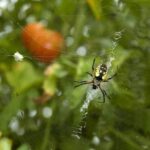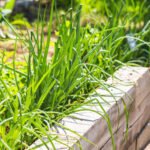Are you tired of finding your vegetable garden destroyed by deer? If so, you’re not alone. Many gardeners struggle with keeping these pests away from their precious produce. In this article, we will explore the impact of deer on vegetable gardens and discuss various natural options for keeping them at bay. From homemade repellent recipes to plant-based deterrents, we will provide you with the information you need to protect your garden.
Deer can wreak havoc on vegetable gardens, causing significant damage to crops and ruining months of hard work. Understanding the need for natural deer repellent is crucial for any gardener looking to protect their harvest. By exploring different methods and options for deterring deer, you can effectively safeguard your vegetables and ensure a bountiful yield.
In the following sections, we will delve into the impact of deer on vegetable gardens, discuss natural repellent options such as homemade recipes and plant-based deterrents, explore physical barriers like fences and netting, and even consider using scents to repel deer. Whether you’re a seasoned gardener or just starting out, this comprehensive guide will equip you with the knowledge and tools needed to keep deer away from your beloved vegetable garden.
The Impact of Deer on Vegetable Gardens
Deer can be a significant threat to vegetable gardens, causing damage to crops and potentially ruining all the hard work put into cultivating a thriving garden. These animals are known for their voracious appetites and can quickly decimate a vegetable patch if left unchecked. Understanding the impact of deer on vegetable gardens is crucial in seeking effective natural deer repellent solutions.
The most common damage caused by deer in vegetable gardens includes the browsing of leaves, stems, and fruits of various plants. This feeding behavior can result in defoliation, broken branches, and even uprooted plants. Additionally, deer can also trample or compact soil, leading to soil erosion and disruption of the garden’s overall structure. The economic impact of deer damage to agricultural crops has been estimated in the millions of dollars annually.
One effective method to address this issue is by implementing natural deer repellents for vegetable gardens. By utilizing natural deterrents instead of harmful chemicals or pesticides, gardeners can protect their crops while promoting an eco-friendly environment. This approach not only safeguards the integrity of the vegetables but also preserves the well-being of other wildlife that may frequent or rely on the garden space.
| Deer Damage | Impact |
|---|---|
| Browsing on leaves, stems, and fruits | Defoliation, broken branches, uprooted plants |
| Trampling or compacting soil | Soil erosion, disruption of garden structure |
| Economic impact | Estimated in millions of dollars annually |
Natural Deer Repellent Options
When it comes to protecting your vegetable garden from deer, there are several natural options available for keeping these animals away. It is essential to consider natural deer repellent for vegetable gardens, as using chemical-based products can potentially harm the environment, other wildlife, and even your crops. In this section, we will discuss various natural options that can effectively keep deer at bay without causing any harm.
Urine-Based Repellents
One of the most effective natural deer repellents is urine-based products. These products contain the scent of predators such as coyotes or wolves, and when applied around the perimeter of your vegetable garden, they can create a sense of danger for deer. This discourages them from entering the area and causing damage to your crops.
Soap-Based Repellents
Another natural option for deterring deer is using soap-based repellents. By hanging bars of strong-smelling soap or placing shavings around your garden, you can create a scent barrier that repels deer. The strong odor of the soap can confuse and overwhelm the senses of deer, making them hesitant to approach your vegetables.
Hot Pepper Spray
Hot pepper spray is an effective homemade natural deer repellent for vegetable gardens. By combining hot peppers with water and a small amount of dish soap, you can create a potent spray that deters deer due to its strong smell and taste. When sprayed on plants or around the garden perimeter, it can effectively discourage deer from feeding on your precious crops.
By considering these natural options for keeping deer away from vegetable gardens, you can protect your hard work and enjoy a bountiful harvest without causing harm to wildlife or the environment. These methods offer safe and sustainable alternatives to chemical-based repellents while effectively deterring unwanted visitors from feasting on your vegetables.
Homemade Deer Repellent Recipes
When it comes to protecting your precious vegetable garden from deer, natural repellents can be an effective and eco-friendly solution. Many commercial deer repellents contain chemicals that can be harmful to the environment, pets, and even humans.
That’s why many gardeners are turning to homemade deer repellent recipes using natural ingredients that are safe and non-toxic. In this section, we’ll explore some simple yet effective DIY natural deer repellent recipes that you can easily make at home to keep those pesky deer away from your vegetable garden.
Hot Pepper Spray
One popular homemade deer repellent recipe is hot pepper spray. Deer are repelled by the strong smell and taste of hot peppers, making this a great natural deterrent. To make hot pepper spray, simply mix together a few tablespoons of crushed red pepper flakes or hot sauce with water and a small amount of dish soap. Transfer the mixture to a spray bottle and apply it to the plants in your vegetable garden.
Egg-Based Repellent
Another easy DIY natural deer repellent recipe involves using eggs. Deer have sensitive noses and are put off by the smell of eggs. To create an egg-based repellent, combine six raw eggs with six cups of water in a blender until well mixed. Pour the mixture into a gallon jug with additional water, then let it sit for about a week before straining out any egg solids. Use a sprayer to apply the liquid directly onto your plants.
Garlic Spray
Garlic is another scent that deer find offensive, making garlic spray an effective natural deer repellent for vegetable gardens. To make garlic spray, mince several cloves of garlic and mix them with water in a container. Let the mixture steep for at least 24 hours before straining out the garlic pieces. Add some dish soap as an adhesive agent, then transfer the liquid into a spray bottle for application.
These homemade deer repellent recipes provide safe and effective alternatives to commercial chemical-based products, helping you protect your vegetable garden while minimizing harm to the environment and its inhabitants.
Plant-Based Deterrents
Plants and herbs can be powerful allies in repelling deer from vegetable gardens. By strategically planting certain varieties, gardeners can discourage deer from entering their garden spaces and protect their precious crops. In this section, we will explore the different plants and herbs that can serve as natural deer repellents for vegetable gardens, providing a sustainable and environmentally-friendly approach to managing deer damage.
One effective plant-based deterrent is lavender, known for its delightful fragrance that humans love but deer detest. Planting lavender around the perimeter of a vegetable garden can create a natural barrier that deters deer from entering. Similarly, marigolds are another excellent choice for repelling deer due to their strong scent and unpalatable taste. These colorful flowers not only add beauty to the garden but also serve as an effective defense against deer.
In addition to lavender and marigolds, thyme and sage are two herbs that have been found to have natural repellent properties against deer. These aromatic herbs emit strong scents that make them unappealing to deer, effectively keeping them at bay.
For those looking to add both flavor and protection to their vegetable gardens, planting thyme and sage can be a dual-purpose solution. A combination of these plant-based deterrents can create a robust defense against deer while adding diversity and visual interest to the garden landscape.
| Plant/Herb | Repellent Properties |
|---|---|
| Lavender | Strong fragrance disliked by deer |
| Marigolds | Strong scent and unpalatable taste |
| Thyme | Strong scent disliked by deer |
| Sage | Aromatic properties deter deer |
Physical Barriers
When it comes to keeping deer away from vegetable gardens, physical barriers such as fences and netting can be highly effective. These barriers act as a solid line of defense against hungry deer looking for a meal in your garden. Here are some options for physical barriers that you can consider implementing:
- Wire Fences: Installing a tall wire fence around your vegetable garden can be a reliable way to keep deer out. Opt for a fence that is at least 8 feet tall to prevent deer from jumping over.
- Electric Fencing: Electric fencing is another option that can effectively deter deer. When touched, the electric shock will startle the deer and discourage them from attempting to enter the garden.
- Netting: Netting can be draped over individual plants or entire garden beds to protect them from deer. This option is ideal for smaller areas or raised garden beds.
In addition to providing protection from deer, these physical barriers can also help safeguard your garden from other wildlife, such as rabbits and groundhogs. However, it’s important to regularly inspect and maintain these barriers to ensure their effectiveness in keeping deer out of your vegetable garden.
It’s worth noting that while physical barriers can be highly effective, they may require some investment of time and money upfront. However, the peace of mind and the safeguarding of your hard work in the garden make this investment well worth it in the long run. Consider incorporating physical barriers alongside other natural deer repellent methods for comprehensive protection against deer damage in your vegetable garden.
Using Scent to Repel Deer
One effective method of keeping deer away from vegetable gardens is by using scents and odors as natural deer repellents. Deer have a strong sense of smell, and certain scents can discourage them from entering the garden. By understanding the scents that repel deer, gardeners can effectively protect their crops without causing harm to the animals.
There are several natural scents and odors that have been proven to deter deer from vegetable gardens. One popular option is the use of predator urine, such as coyote or fox urine, which creates the impression that a dangerous predator is nearby.
Additionally, some gardeners have found success in using human hair or soap shavings as a means of creating an unfamiliar scent that repels deer. Both these options capitalize on the idea of confusing or intimidating the deer with foreign smells.
Another natural scent-based deer repellent for vegetable gardens is the use of strong-smelling plants and herbs. For example, planting lavender, garlic, or mint around the perimeter of the garden can emit odors that are unappealing to deer. These plants not only serve as a protective barrier but also offer added aesthetic value to the garden.
In addition to these methods, there are commercial products available that utilize concentrated versions of these natural scents. These products are designed to be long-lasting and weather-resistant, providing a convenient solution for gardeners who want to protect their crops effectively. Using scent as a natural deer repellent for vegetable gardens can be an environmentally friendly and humane way to discourage unwanted wildlife while promoting harmonious coexistence with nature.
Tips for Success
When it comes to using natural deer repellent for vegetable gardens, there are some key tips and best practices that can help ensure its effectiveness. Here are some important tips for success:
1. Identify the most vulnerable areas of your garden: Take note of the areas in your vegetable garden that are most susceptible to deer damage. This could include the perimeter of the garden, as well as specific plants that deer tend to target. By identifying these areas, you can focus your repellent efforts where they will be most effective.
2. Rotate repellent options: Deer can become accustomed to certain scents or tastes over time, so it’s important to rotate between different natural repellent options. This could include using a combination of plant-based deterrents, homemade repellent recipes, and physical barriers like fencing or netting. By changing up your tactics, you can make it more difficult for deer to become acclimated to any one method.
3. Reapply as needed: Natural deer repellents may need to be reapplied regularly, especially after rain or heavy watering. Keep an eye on the condition of your repellents and be prepared to reapply them as necessary to maintain their effectiveness.
4. Monitor and adjust: Pay attention to any signs of deer activity in your garden, such as tracks or damaged plants. This can help you determine if your repellent methods are working effectively or if adjustments need to be made.
By following these tips and best practices, you can increase the likelihood of successfully keeping deer out of your vegetable garden using natural methods.
Conclusion
In conclusion, it is clear that the use of natural deer repellent for vegetable gardens is crucial in preventing the damage caused by these animals. With their voracious appetite for plants, deer can wreak havoc on vegetable gardens, leaving behind destruction and frustration for gardeners. However, there are various options available for keeping deer at bay without resorting to harmful chemicals or expensive solutions.
From homemade repellent recipes to plant-based deterrents and physical barriers such as fences and netting, there are numerous natural methods that can be effective in deterring deer from vegetable gardens. By incorporating these strategies into garden maintenance routines, gardeners can protect their hard work and ensure a bountiful harvest.
It is important for gardeners to take action and implement these natural deer repellent methods to safeguard their vegetable gardens. By doing so, they can enjoy the beauty of their garden without the constant threat of deer damage.
Whether it’s using scents and odors or planting certain herbs and flowers with repelling properties, taking proactive measures will ultimately lead to a flourishing vegetable garden free from deer interference. By understanding the need for natural deer repellent and exploring the various options available, gardeners can reclaim control over their gardens and preserve the fruits of their labor.

If you’re looking to get into vegetable gardening, or are just looking for some tips on how to make your current garden better, then you’ve come to the right place! My name is Ethel and I have been gardening for years. In this blog, I’m going to share with you some of my best tips on how to create a successful vegetable garden.





